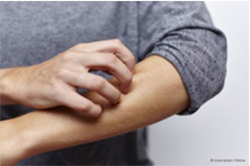Neurodermatitis: New treatment stops inflammatory outbreaks

Neurodermatitis, also called atopic dermatitis, is one of the most common skin diseases. In Germany about 3.5 to 5 million people suffer from the often severely itchy reddened skin. "In adults, the course of the disease is often particularly difficult and causes a high level of suffering," says Dr. Sabine Müller. The senior physician in the Department of Dermatology at the Medical Center - University of Freiburg is the head of the Clinical Allergology division as well as the surgery for urticaria and neurodermatitis for adults.
For mild to moderate symptoms, individually-tailored skin care helps, as well as antipruritic (anti-itching) and anti-inflammatory ointments. In adults with severe neurodermatitis, cortisone or drugs that suppress the immune system almost completely, called immunosuppressants, have so far been used. However, both of these therapies are not suitable for long-term treatment due to the often strong side-effects, and do not work for about every fifth patient.
Effective and with few side-effects
"After many years of waiting, we have recently been able to offer these particularly severely affected patients an antibody treatment that intervenes specifically in the inflammatory cascade of neurodermatitis," says Dr. Müller.
Not only do the severity and extent of the eczema decrease, the active ingredient also relieves the tormenting itching. "About every third patient is free or almost free of symptoms after three months," the senior physician summarizes the results.
The antibody dupilumab is injected into the thigh or abdomen regularly every two weeks, comparable to injecting insulin. "After instruction, our patients can do this independently at home," explains Dr. Müller.
Quality of life greatly improves
"Another positive aspect is that as symptoms improve, existing anxiety or depression decreases. As a result, the quality of life of our patients also improves," the dermatologist Dr. Müller observes. In a neurodermatitis outbreak, the body releases more of the inflammatory substance interleukin-4. The newly developed monoclonal antibody dupilumab captures the inflammatory substance and neutralizes it. Thus, excessive inflammatory reactions are reduced or even prevented altogether. "The effect of the medicine is very good, with simultaneously low side-effects," Dr. Müller elucidates.
Approval for children is expected
"We hope that the antibody treatment will be approved for children in a few years. Because twice as many children as adults suffer from severe neurodermatitis," adds Professor Dr. Christoph Schempp. He heads consultations for Pediatric Dermatology in the Department of Dermatology at the Medical Center - University of Freiburg, where children with neurodermatitis receive medical treatment¹. "For many, the disease fortunately disappears again until puberty," says the dermatologist. Together with Dr Müller, Professor Schempp supervises the profile group "Inflammatory Skin Diseases" at the Department of Dermatology, and is also head of the Skinitial research center.
The two doctors are convinced that new and very effective medicines against neurodermatitis will follow in the coming years. The study site for inflammatory skin diseases at the Department of Dermatology participates in many of these studies.
¹Please note, the Department of Dermatology of the Medical Center – University of Freiburg only accepts children who already have switched from breastfeeding (or its supplement) to solid food.
Back